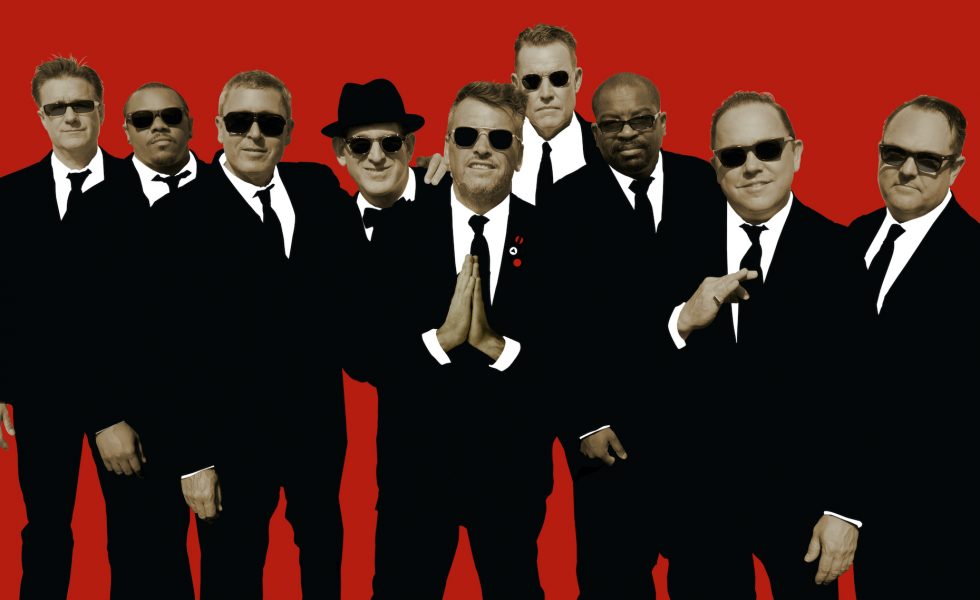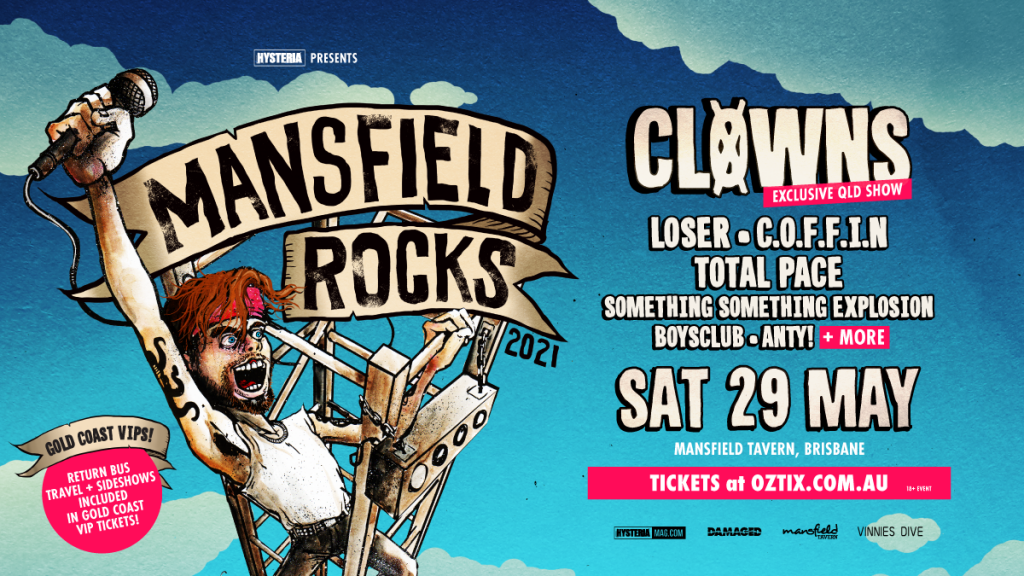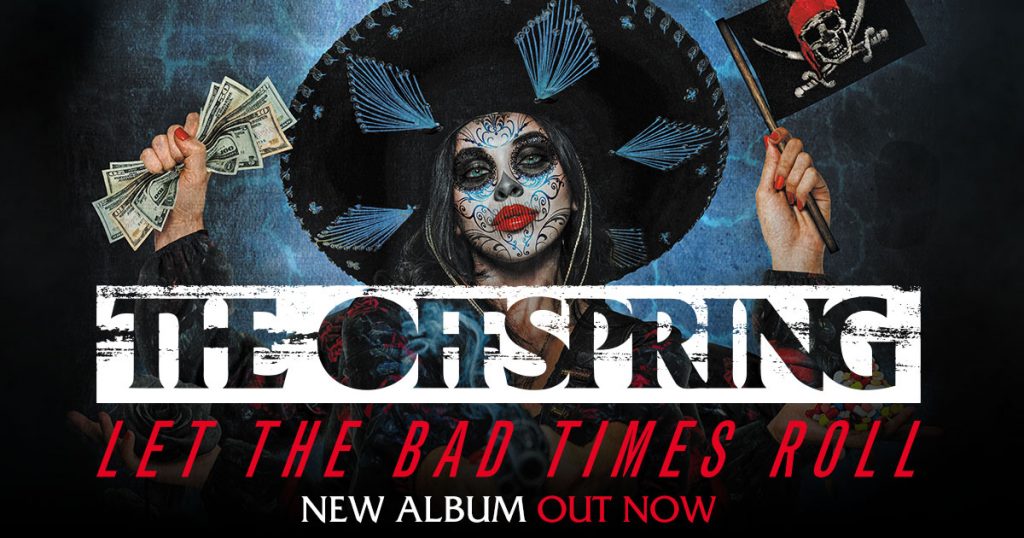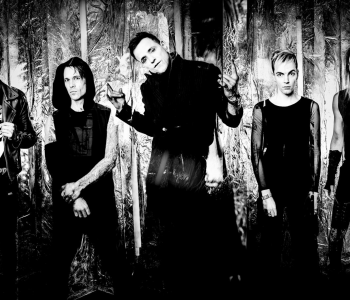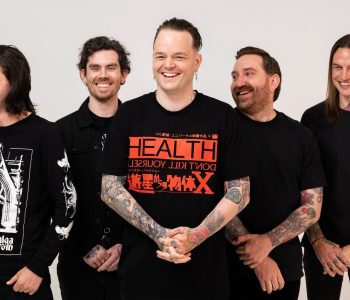Korn‘s Jonathan Davis was so excited by ORGY that he created his own record label …
When God Was Great – the 11th studio album by ska-punk pioneers The Mighty Mighty BossTones – is a collection of 15 killer tracks, zero filler. But Dicky Barrett, The Mighty Mighty BossToneS frontman and announcer for Jimmy Kimmel Live!, is the first to admit that he would probably hesitate to drop the needle on a 15-track record.
MORE: EXCLUSIVE ALBUM PREMIERE: Dr Colossus // REDHOOK: Bad Apples, Bad Decisions and Great Tunes // GOJIRA: ThePower and the Passion // VOID OF VISION: Something Old, Something New REVIEWS: REDHOOK: Bad Decisions // DROPKICK MURPHYS: Turn Up That Dial // ROYAL BLOOD: Typhoons // GOJIRA: Fortitude // CLOWNS: Does It Matter? // THE MIGHTY MIGHTY BOSSTONES: When God Was Great
“I mean, if I picked it up and said, ‘Oh, this is too long,’ if you look at the running time and then you go, ‘Oh, and then I’m supposed to listen to an eight-minute song at the end!? Forget about it!’” he laughs. “But I mean, what goes? There’s nothing that I could really cut loose and there were some other songs that didn’t make this opus, this epic opus… So I’m the father of it, I certainly couldn’t cut anything off, and the producers [Ted Hutt (The Gaslight Anthem, Dropkick Murphys) and Rancid frontman Tim Armstrong (Transplants, Jimmy Cliff)] felt the same way… they couldn’t come up with any fat that needed to be trimmed. So I lucked-out in that way and that’s the truth. And I also think it’s a good time to get back to listening instead of laying there and flipping through Netflix, and falling asleep trying to sort out what you’re gonna watch, you know? I think letting something like music enter your head for just under an hour is not a bad idea.”
We dare you to try to scroll through your social media feeds while listening to When God Was Great. It’s not really possible for a variety of reasons: the instrumental mastery on display, the dynamic interest within each song arrangement and Barrett’s excellent diction. “I took speech classes when I was little,” Barrett chuckles. “It’s very important. And, besides, the way that the Boston accent works is very close to the Australian accent; we swallow our ‘r’s the same way. And I think that also both are very close to ‘The Queen’s English’, which, here in the United States that’s very important. You know, when you hear a guy from Texas tell me I talk funny, I go, ‘Wow!’”
When they’re told one of our favourite tracks off the album is Certain Things, Barrett says, “That’s my favourite song on the record, too. Certain Things was written – I have an enormous love for ‘70s AM gold, what you heard on AM radio in the 1970s. And the people who wrote those songs: Jimmy Webb and Glenn Campbell and people like that. So that was the general idea, musically, of what we wanted to do. And so the keyboard player John [Goetchius] wrote this really, really melodic, really hooky sort of musical piece, and I had those lyrics and they just fit together so well!
“And then we didn’t let our tendency just to go, ‘Okay, well, we can’t do this, musically; now it’s time to BossTones it up,’ [take hold] – we didn’t, you know? I mean, it’s going to feel like ‘us’ when the dust settles and all is said and done, but we’re not gonna force it. And we weren’t gonna take the elements and the things that we loved so much when we were building it, out of it. And that was the, you know, Glenn Campbell, 1970s, almost country – I don’t want to scare anybody away [laughs] – sort of feel. But not country as we currently know it, country as country music once was.”
Barrett says he prefers to leave space for the fans to interpret BossTones songs based on their own experiences.
“I don’t want to take anything away from anybody that puts their own personal meaning behind it. That’s what I like about music and I always kind of hate when I’ll be be like, ‘Oh, this is what this song means to me,’ and then I hear somebody go, ‘Well, actually that song’s about…’ and I go ‘Ugh! Now it can’t be about my uncle any more!’ And I think that that’s sort of how I create the songs, is for people to connect to them in whatever way, and however, they do. And [Certain Things] comes from a personal place, but it’s also meant to be felt personally [by the listener], too, and that means whatever you get from it is what it is.”
On episode 41 of Chris DeMakes A Podcast, where Less Than Jake guitarist and vocalist chats with Barrett and The Mighty Mighty BossTones bassist Joe Gittleman – is thoroughly recommended listening for BossTones fans. “It was good?” Barrett says. “We’ve known Chris for quite some time, and me and Joe are like husband and wife, or husband and husband or wife and wife – however we identify our relationship,” he laughs. “You know The Muppets? The two old guys [Statler and Waldorf] that are always sitting there and making commentary on anything? That’s me and Joe.”
In fact, The Mighty Mighty BossTones made an appearance on a Sesame Street special that aired on the ABC in 1998, which featured songs interpreted by celebrity guests. “The BossTones did this song called the Zig Zag Dance and it was on a television show called Elmapalooza! that Jon Stewart hosted featuring artists of the late-1990s, including Aerosmith and – who else was on it? They all did different Sesame Street songs and we performed a song with Count von Count… The reason we wanted to work with Count is: we thought he was the snappiest dresser. And a lot of [the Muppets] don’t even wear clothes, so…”
The Mighty Mighty BossTones & Count von Count – Zig Zag Dance
While we’re on the subject of snappy dressing, what is Barrett’s version of activewear? Barrett laughs heartily before responding, “I like to wear a nice plaid jogging suit that I got online. I look like an extra from The Sopranos, except that it’s tartan and it’s very sharp. A lot of people comment on it, ‘Wow, where did you get that?’ The thing about it is, all of a sudden it started appearing on my phone as a suggested purchase, ‘Maybe you’d like this?’ And I was saying into my phone, ‘You know I like that, but I really don’t want to invest in it right now.’ And it was even texted to me at one point, this thing [plaid jogging suit]!”
He spent the majority of his lockdown time in Los Angeles. Whether he participated in any of the Black Lives Matter protests, Barrett says, “Yes, immediately. I can tell you what it was like when I went I went to one in Hollywood, in Los Angeles. It was peaceful when I was there. Maybe it got a little different as night fell, but when I was there it was young people that were visibly upset, but didn’t seem hostile or dangerous. They seemed somewhat desperate and somewhat sad, but it didn’t feel like a dangerous atmosphere. In different places the images they were showing on TV seemed to be different than what I experienced, but when I went it seemed like, ‘Okay, listen to us and listen to us now,’ that sort of vibe, not, ‘We’re here to fuck everything up’… I think that what they show on the news – so if it’s a whole day of people chanting, ‘Say his name,’ or, ‘Never again,’ or that kind of thing, it doesn’t play as well [on the news] as if you show a car on fire; so they showed more of that. And I’m not saying that didn’t go on, I’m saying that for every car on fire there was thousands of people holding hands and just saddened by the whole state of affairs. So that’s just my interpretation of what I witnessed at that time, almost a year ago now.”
The Mighty Mighty BossTones – The Killing Of Georgie Part III
The Killing Of Georgie Part III, another standout track from When God Was Great, makes a powerful statement about the murder of George Floyd, which sparked the Black Lives Matter movement worldwide. “I think that [The Killing Of Georgie Part III] speaks more on how people reacted to the event than it does the event itself; that’s where I was coming from: the days after George Floyd was murdered,” Barrett says. “The embarrassment… We didn’t have any great leaders to somewhat guide us through something that was so dark and so tragic. Like, you know: when Martin Luther King was killed in the 1960s, Robert F. Kennedy stood up and gave a spectacular speech that somehow pulled people together.
I don’t want to take anything away from anybody that puts their own personal meaning behind it. That’s what I like about music and I always kind of hate when I’ll be be like, ‘Oh, this is what this song means to me,’ and then I hear somebody go, ‘Well, actually that song’s about…’ and I go ‘Ugh! Now it can’t be about my uncle any more!’
[ Dicky Barrett ]
“And I often think that when Martin Luther King gave his speech – his I Have A Dream speech – I don’t think if you said, ‘Hey, in 2021 not much will have changed, you know, your dream will not be realised at that point.’ I think that he would laugh and say, ‘No, that can’t be the case; I have more faith in human beings and things will be different. I think we’re heading in the right direction and I believe that we’re making strides.’ And it feels like just as you feel like you’re leaning forward, all of a sudden you’re moving backwards and that, to me, is super-tragic and super-sad. I think that it’s dismal and, you know, will the same thing be said again another 20 or 30 years down the line? And will my kids be going, ‘Gosh, despite the civil rights [movement] and everything that we’ve been through, we still can’t get along as people and we still can’t respect others that are not the same as we are, and we are still judging people based on their skin colour, their religious beliefs and sexual preferences’ – it’s remarkable!
“And we wrote a song in 1997 called Let’s Face It, on the album of the same name, and if you told us then that we wouldn’t make any sort of advancements, or things wouldn’t be different in 2021, I would’ve said, ‘You’ve got to be wrong. That can’t be the case. That can’t be true. Please take me to your time machine and I will show you that it’s a better world.’ I don’t know, I mean, sadly: do I have the answers or the solution? No. But I definitely have eyes and I know that this is a problem.”
The Mighty Mighty BossTones – Let’s Face It
Although the band’s latest record doesn’t shy away from challenging subject matter, the jubilant nature of this music – cheerful brass stabs, punchy tempos – makes it easily digestible and we’re left feeling hopeful. “I don’t think it avoids any issues or runs from anything,” Barrett says. “I think that – like everything we do – it always offers hope. I think that we never make an album and then at the end of it you go, ‘Oh, well, we’re fucked!’” he laughs. “It’s sort of more like, ‘Well, this doesn’t have to be this way,’ or, ‘There is hope and through the strength of love, and through the strength of unity and community, perhaps let’s keep pushing forward. The alternative isn’t worth anything and I’m glad to hear that that’s what you got from it, because that’s certainly the message that we were trying to send: ‘Let’s not turn our backs on anything, but, while we’re confronting this stuff, let’s try to feel good’.”
If you had When God Was Great on in the background, it just sounds like a party. But once you home in on the lyrical content, there’s much social commentary to sink your teeth into. “You’re like, ‘Oh, wait, this guy’s at the party!’” Barrett guffaws.
The Mighty Mighty BossTones – The Final Parade
In what Barrett describes as a “bold move”, The ‘Tones released When God Was Great’s eight-minute closer, The Final Parade – an all-star ode to ska-punk – as a single. “Joe, the bass player, said, ‘Hey, we should release The Final Parade,’ which we always thought was more of a gimmick thing and a novelty track,” Barrett recalls. “But then it came out so good! And I wasn’t afraid to go, ‘Alright, eight minutes – there you go; here’s our first single!’ It’s the kind of track that if you heard it in the nightclub, you’d just keep dancing. That was the idea and it delivered. It could’ve fallen short and it still would’ve been on the record, because I still like the message of unity, but, also, it came out and was a damn good song!”
The list of guest contributors (labelled “The Ska Summit” by Armstrong) on The Final Parade is a who’s who of ska-punk royalty and Barrett remembers, of inviting these legends to feature on this track, “We could barely get the sentence out before people said, ‘Yes, count me in! And I’ll get that to you in an hour’… And then the word spread and we got calls of, ‘Hey, why am I not in that?’ And we’d say, ‘I’m very sorry, you are now!’”
The Final Parade is “a love letter to ska music and the people that make ska music… We played around with our punk-rock-reggae sound/‘Cause sometimes dancing is all you’ve got/We were crankin’/And we were skankin’… All over the world.” Of this bombastic party anthem, Barrett tells, “We wanted it to be a testimony to our own personal journey that included so many people, and so many friends, and, you know, other bands that have sort of carried the same torch and delivered the same message. And [all of these featured ska artists] have been inspired by the same types of music and artists, and played a huge part in who we are. And who we toured with, and who we listen to, and who we became friends with was completely part of our identity, which – the only word I can think to use is ‘scene’. But it was more than that: it was a family.”
We’re imagining The Ska Summit all crowding around a single mic in the recording studio, but Barrett says, “I wish! I’d like people imagining me and Angelo [Moore, Fishbone] and Jimmy G From Murphy’s Law standing around like it was Live Aid. Yeah, all of a sudden you see The Interrupters – they’re up there, too – and there’s Roddy Radiation from The Specials and Jake Burns from Stiff Little Fingers. But that wasn’t the case and that’s why when I talk about how the song was made, I have to sort of pull back the curtain a little bit and say, ‘Okay, really what happened was we knew that most artists – and most people who made music during lockdown – upped their home-recording-studio game,’ you know? They knew that they were gonna be home and they knew that they would want to make music, so they had equipment – like we did, all of a sudden – that was better than we’ve ever had before and they had the ability to deliver us tracks, and we took advantage of that. You know, so call Steve Jackson from the Pietasters or even the great Peter Porker from The Porkers and say, ‘Hey, Pete! Do you wanna sing…’ – actually do we call that singing, what Pete does?” he laughs, before continuing, “‘Do you want to be on this track?’ And then, of course, Pete did. Pete’s from Newcastle.”
Although Barrett says The Mighty Mighty BossTones “really had a great time” recording When God Was Great, he stresses, “Which is sad to say… Because a lot of people have suffered, and a lot of people were hit hard by all of this [COVID], so if you hear me go, ‘Oh, we didn’t get to play with Madness at The Greek Theatre [now rescheduled until May, 2022],’ then, ‘Boo-hoo, Dicky!’… I’m not so insensitive to the fact that some people’s worlds were ending and mine certainly wasn’t.”


